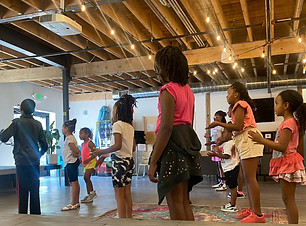
'One Tribe' Family Freedom School

The One Tribe Freedom School launched in 2019 as an interdisciplinary, research-based curriculum built on an ethic of decolonization and humanizing education while building literacy skills for students in early childhood education through high school. The curriculum is focused on providing space for families (youth and parents) to develop a criticality and ability to identify and call-out the inequities and injustices that often exist inside of systems and institutions that as a society we often come to accept as the norm or status quo.



Re-humanizing education through a community sustaining and revitalizing approach
MISSION
The mission of the Freedom School is to re-humanize education through a community sustaining and revitalizing approach. This will be accomplished through a humanizing education. Humanizatization is the process of becoming more fully human as social, historical, thinking, communicating, transformative, creative persons who participate in and with the world (Freire, 1970). Becoming more fully human requires critical consciousness, the process of “learning to perceive social, political, and economic contradictions, and to take action against the oppressive elements of reality” (Freire, 1970, p. 17). A humanizing education is the practice of freedom that envelops the community, family, and child through academics, culture, well-being, health, and justice.
VISION
The Freedom School intervention aims to attain student and parent outcomes identified as the 6 C’s:

-
Community-Family-Self Love & Healing: Develop a strong sense of self and experience mental, physical, and spiritual healing from the effects of systemic racism (e.g., self-awareness of strengths and needs; social-emotional intelligence; motivation; internalized belief in ability to succeed; knowledge of and pride in cultural heritage, history, and phenotype; community-building; radical self-love; self-actualization; healing habits (e.g., meditation; mindfulness); physical and mental health)
-
Critical Consciousness: (e.g., interpreting and creating graphs, charts, tables, statistics, and data that reveal or maintain inequality; “reading the word and reading the world”; development of bilingual oral language and literacy skills; interpersonal communication; culturally mediated public speaking and oratory)Learn to perceive social, political, and economic contradictions, and take action against the oppressive elements of reality aided by literacy, communication, and numeracy skills
-
College, Career, Life Preparedness: Attain and apply knowledge and skills to prepare for and navigate post-secondary options and life opportunities and challenges (e.g., admissions requirements; cost of college; purpose and opportunities of college; college culture and norms; challenges; resources; goal-setting, time management, study skills; relationships with professors; career possibilities and planning; role models; affinity groups, financial literacy; career counseling; trade school + route; entrepreneurship)
-
Community-Powered Problem-Solving: Enact culturally mediated approaches to addressing community challenges (e.g., analytic reasoning; inquiry; problem-solving; systems thinking; critical and creative thinking; use tools, resources, and technology to access and evaluate information, solve problems, and create new knowledge; collaboration; application to solve community needs; participatory visioning)
-
Civic Engagement: Challenge Inequality & Systems of Power & Oppression; Develop awareness of, and challenge, privilege, and systemic oppression (e.g., persistence/ganas; identify support systems and resources in dealing with challenges; conflict resolution; intersectionality; develop awareness of and challenge privilege and systemic oppression)
-
Cultural Revitalization: Transform Self, Community, World; Engage in coalition building for healing, education, and racial justice (e.g., critical consciousness; coalition building; civic engagement; community outreach & organizing; activism; resistance; racial justice; healing justice; local and global social justice)

HISTORY
Freedom Schools originated in the 1960s as a network of alternative schools offering Black middle and high school students in Mississippi an education founded on academics, activism, and racial justice (Perlstein, 1990). Youth who participated in Freedom Schools were immersed in “empowerment, politicization, resistance, and organization” (Hale, 2016, p. 2). Many joined the front lines of the Civil Rights Movement and emerged as powerful figures ending racial segregation.
RRI's Freedom School name, 'One Tribe', is inspired by the powerful words of Coates (2015) and his portrayal of the social construction of race as the washing of disparate tribes. While race is a mirage (Kendi, 2019), BIPOC are bound by our common experience of marginalization, and our exertion of power in the margins. We are a tribe—a group that consists of families, kinship, clans, and our ancestors. We are indigenous to our sacred lands across the Earth. We coalesce as one tribe that moves in unison to ensure freedom and justice for those who are historically marginalized and denied these human rights.
While Freedom Schools were initially created for Black communities, the aims can apply to Indigenous peoples and people of color, who share the historical trauma of subjugation, oppression, ethnic cleansing, and genocide perpetrated through white supremacy.
.png)